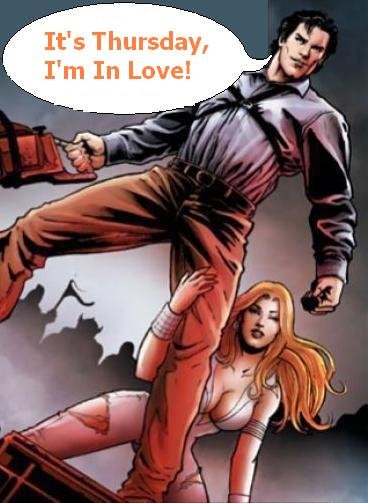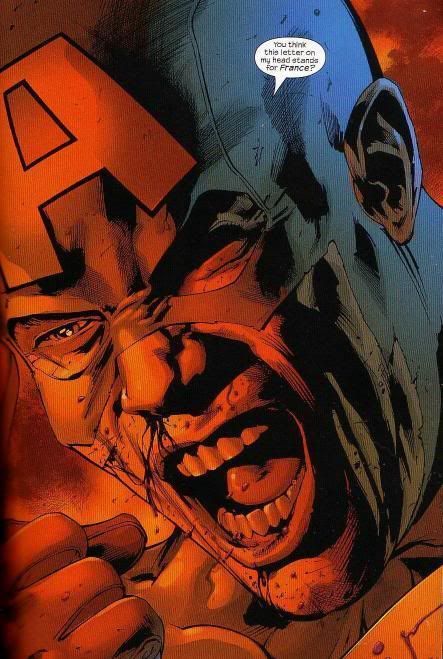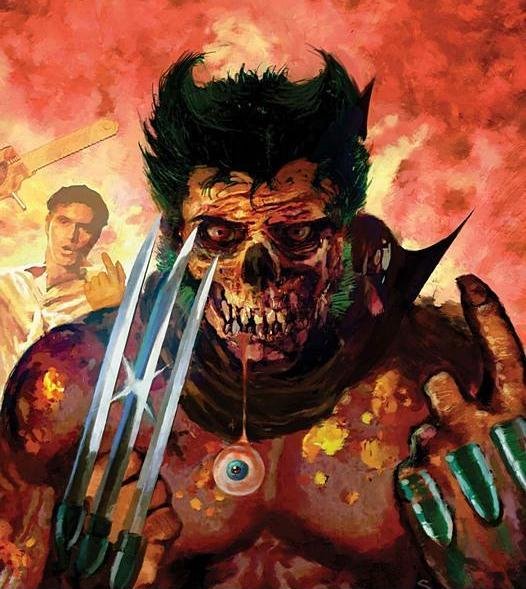KEVIN FEIGE ON BRINGING ‘IRON MAN’ TO THE BIG SCREEN
Marvel Studios’ president addresses unconventional casting and the possibility of bringing Earth’s Mightiest Heroes together on-screen
By Rickey Purdin | Posted September 3, 2007 1:00 PM |
Wizard recently visited the set of the highly anticipated “Iron Man” film, which hits theaters May 2, 2008, and will be the first feature out of the gate from fledgling Marvel Studios. In a roundtable interview, studio President Kevin Feige talked about the years-long effort to bring “Iron Man” to the big screen and why making seemingly unconventional choices in cast and crew has proven so successful with Marvel films.
 Why did “Iron Man” take so long? This has been kicking around for years now.
Why did “Iron Man” take so long? This has been kicking around for years now.FEIGE: It seems that after a good 10 or 15 years, each character’s ready to go. I mean, the gestation period is very similar to what “X-Men” was and what “Hulk” was and what “Spider-Man” was. It just seems that the time is right. Everyone has to wait for their at-bat, and now it’s “Iron Man’s” turn.
You’ve had big-name actors connected with this thing, you’ve had directors connected, they’ve come and gone. Is this something that’s more difficult to pull together than some of the other ones have been?
FEIGE: They’re all difficult. Every translation from a comic to a movie is difficult. Every film that is made is difficult. I wouldn’t say this is more difficult than any of the other ones. But frankly, and as you’re all familiar with the journey and the rights issues that were tangled up with “Spider-Man” for so long and because these contracts and these characters have been around for so long, and various people and entities and companies and corporations have had their fingers on it at some point, it takes a while. In the case of “Iron Man,” there weren’t those kind of complications. There was a first incarnation at New Line and they attempted to put that together and it didn’t quite work out.
You’ve had some interesting choices for the creative people involved in this film that are outside kind of what you would think of as mainstream comic books for your movie. Can you talk about why those kinds of choices were made rather than going with someone who might be more conventional? Or more fit in the idea of a comic book?
FEIGE: Well, you know the idea of a conventional director for one of our movies or a conventional star for one of our movies or something that might be more in line with a comic book movie, look at the people you’d be referring to now. Is Tobey Maguire more conventional for a comic book movie like this? Is Hugh Jackman more conventional? Is Bryan Singer, Sam Raimi—well, they are now because we picked them and we hired them and we turned out good product with them. But if you go back to before that, he’s the guy who’d done “Usual Suspects,” made very little at the box office, was just a great film and a great film maker. Tobey Maguire had done “The Ice Storm” and “Cider House Rules” and some great things but certainly never put on a costume and swung around and fought the bad guys before. Hugh Jackman was singing in the West End of London when we hired him for Wolverine. We always hire, whether they’re famous or not, the people that we think would best fit the role and best become the character. And in the case of Robert Downey Jr., he is a great, great actor and embodies that intelligence and that fun and that humor and sort of a wryness that certainly I always loved when I was reading the Iron Man comics. And the fact that he was so enthusiastic to come into a movie like this was also very intriguing. And same thing with Favreau, you look at his films, there’s some cool sequences within “Elf” that certainly start to elevate above what you would expect out of a Will Ferrell comedy. “Zathura” was extremely well handled in terms of his direction for it, sci-fi and dealing with more effects. And he came into us very interested in this project and this genre and obviously we brought him on board thinking he could give yet another unique out of these. These aren’t cookie-cutter products that we’re churning out. We want each of them to live and breathe on their own.
In the current sphere of comics, Tony Stark’s sort of a jerk. Was there concern about that? Is the whole idea by the time the movie comes out something’s revealed so that the non-core Iron Man fans, maybe other Marvel fans don’t look at him so negatively as a character?
FEIGE: I think people could argue whether you could look at him negatively or not. From Civil War, I think the way he ended up in Civil War was pretty cool and he was pretty smart and he did something that not a lot of people would be willing to do. He essentially put himself out there knowing people would look at him as being a jerk for the greater good, for what he perceived as the greater good in the comics.
The truth is, anybody that I’m having this kind of a dialogue with would have to be a die-hard comic fan and if they’re interested enough in the subtleties of his character within a certain storyline in the comics, I think they’re coming to the movie. At least that’s what we’ve seen in the past. Civil War has been great. Iron Man has been on more comic covers in the past year than he was probably in two or three years before that as a lead role.
In terms of him being a jerk or not a jerk, I think we’ll start to see more of traditional heroic Tony Stark in the comics. There’s always sort of various continuities going on at the same time and it was only Civil War that he did what some people might claim are questionable actions, but even then if people are talking about Iron Man, I’m very happy.
 The fact that Marvel Studios is controlling “Thor” and “Captain America” and “Iron Man,” is there a possibility of an “Avengers” storyline anywhere in the future?
The fact that Marvel Studios is controlling “Thor” and “Captain America” and “Iron Man,” is there a possibility of an “Avengers” storyline anywhere in the future?FEIGE: I would love to….What was preventing certain characters from crossing over in the past was the fact that they were all divvied up from different studios and there were big giant gates in between them and they couldn’t play in the same sandbox, and now that we have Hulk and Thor and Cap and Iron Man certainly would indicate to me that it might be fun to see them all in the same sandbox at some point. But certainly we’re introducing them and building them in their own franchises first.
Why did you guys choose Afghanistan instead of Iraq for this, the original story of Stark in this film? Because the original origin story, Vietnam and Iraq are much closer. Were you trying to avoid any controversy?
FEIGE: No. I don’t think we’re looking for controversy but I don’t think we’re actively avoiding either. I’m going to be called on my historical inaccuracies here, but I think in the early ’60s, America hadn’t entered Vietnam yet and wasn’t an active war going on when Tony Stark was injured by Wong Chu in the origin story. So the story was never about him going into an active war zone necessarily. He was entering into a conflict that was sort of brewing, much in the same way today that Afghanistan is sort of this continued conflict as opposed to an active, full-on war. So I think that was probably part of our reasoning. By the way, we may not even call it Afghanistan in the movie.
How do you align yourself in terms of the different properties? Do you separate what that origin story is from the live-action movie in terms of the way you are trying to expand?
FEIGE: Are you talking about our direct-to-DVD “Invincible Iron Man” animated movie?
Exactly.
FEIGE: Second highest-selling animated DVD, direct to DVD. Yeah. You translate it to the medium. The medium for direct-to-DVD animated feature and that audience and what fits in there can often be different than a giant summer blockbuster film. So we adapt them to fit the medium that we’re putting them into.
Do you learn lessons from doing that that you can apply to the live action?
FEIGE: Absolutely. I mean, Jon will tell you that we’ve had stacks of comic reference, we had stacks of reference from the ’60s “Iron Man” cartoon, from the ’90s “Iron Man” cartoon, although less from that and even some designs and some story elements from the animated. It’s all about looking at all of the source materials available and picking and choosing from there to formulate what we would believe to be the best story possible.
I asked this of Jon and he had one answer for it and I’ll ask you as well. The decision not to have the alcoholism storyline in Tony Stark’s character in “Iron Man,” the question comes up because Robert Downey Jr. has his own personal issues that sort of resonate with the character. Why was that decision made for this film?
FEIGE: Well, the story of Iron Man was never the story of an alcoholic that became a superhero. You know, the “Demon in a Bottle” storyline is a wonderful storyline but it was, you know, two or three arcs out of, I don’t know, 100 arcs over the past 45 years. It was never his defining attribute or his defining storyline. It’s something I think would be interesting down the road somewhere. I think all of our characters dealing with their flaws, and certainly whether it’s Peter Parker or any of our characters, Bruce Banner dealing with the flaws of their character, the curse of their powers, that’s always fun to play with. That’s always frankly what I think makes our characters stand apart is that they do have flaws and they do have struggles and they are battling not just whatever evil supervillain they’re up against, but they’re also dealing with issues that we all deal with in real life. And certainly that’s the case with that particular storyline of Tony Stark, but it was never our intention to play with that in the first; I don’t know if we’ll play in that with the first three movies. If we’re lucky enough that the character takes off and that people respond to him the way we hope they do, I’d love to play with that storyline at some point.
Can you talk about Jon’s touch on this particular movie? Like the humor? Can you explain how we’re going to see it?
FEIGE: Yeah. I mean, Favreau is a great storyteller. He’s a great filmmaker. He’s a hilarious person. Yes, there’s certainly an element of fun that he brings to it. But there’s also, he also is very demanding when it comes to the story. And if something’s not working, he will stop everything until he thinks that it’s working. And that’s what good directors do. But there is something in terms of the interactions of the characters, in terms of…you know, Jeff Bridges had said “Oh, we’re ad-libbing everything and it’s great and stuff.” And we’re not ad libbing everything. But Jon brings that feeling about that he likes to get the input from the actors, and if somebody has a better line, it’s going in the movie.
Who seems to be providing that the most?
FEIGE: Actually, everyone is, believe it or not. Gwyneth is and Robert is and Jeff is and Terrence. And that all comes and it’s filtered through Jon based on the atmosphere that he brings onto the set.



No comments:
Post a Comment